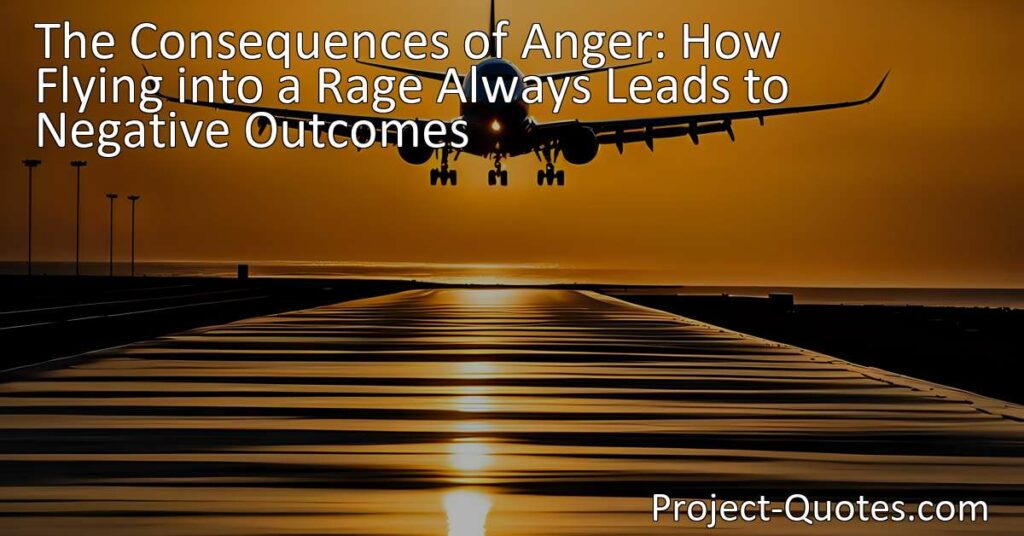People who fly into a rage always make a bad landing.
Will Rogers
Managing Anger Effectively: Navigating Through Life’s Tempests with Grace and ComposureLearning to manage anger effectively is crucial for avoiding negative outcomes in life. When anger controls our actions, it damages relationships, impairs judgment, and poses significant mental and physical health risks. By cultivating emotional intelligence, practicing self-control, and fostering empathy, we can steer our emotions in a more positive direction and maintain understanding, respect, and harmony in our interactions with others and ourselves.
Table of Contents
Meaning of Quote – People who fly into a rage always make a bad landing.
Have you ever noticed how some people have a tendency to lose their cool at the slightest provocation? It’s almost as if they have a hard time controlling their anger and end up exploding like a volcano! Well, there is a famous quote by Will Rogers that perfectly sums up the consequences of such behavior: “People who fly into a rage always make a bad landing.” This single sentence holds a valuable lesson that we must all take to heart – allowing anger to control our actions leads to negative outcomes.
Now, let’s delve deeper into this quote and explore the myriad of ways in which losing our temper can lead to undesirable consequences. It is important to note that anger is a natural emotion, and feeling angry at times is perfectly normal. However, it’s how we choose to express and handle our anger that determines whether we crash and burn or maintain a smooth landing.
Firstly, let’s consider the immediate impact of an angry outburst. When we allow anger to consume us, our judgment becomes clouded, and we often act impulsively without considering the consequences. Take a moment to reflect on situations when you have witnessed someone in a fit of rage. Did the outcome of their anger bring about positive change, or did it only escalate the situation further? More often than not, shouting, name-calling, or even physical violence only serves to worsen the problem, resulting in strained relationships and damaged trust.
Moreover, anger often blinds us to the perspectives and feelings of others. In our rage, we become so focused on defending our own position that we fail to listen to alternative viewpoints or empathize with those who may have contributed to our frustration. This lack of understanding can have long-lasting effects on our relationships, as it erodes communication and mutual respect. It’s important to remember that conflicts can only be resolved through open dialogue and active listening, not by letting anger control the conversation.
Additionally, anger has detrimental effects on our physical and mental well-being. When we allow rage to consume us, our bodies flood with stress hormones, leading to increased heart rate, high blood pressure, and weakened immune systems. These physical symptoms not only pose significant health risks but also hinder our ability to think clearly and make rational decisions. In essence, losing our temper not only harms our relationships but also takes a toll on our overall health.
Furthermore, there are broader societal implications to consider when we fly into a rage. Think about how anger has been used throughout history as a tool for inciting violence and perpetuating hatred. From riots to wars, countless conflicts have arisen due to individuals or groups succumbing to their rage. It’s crucial to recognize the power anger holds and choose to channel it constructively rather than destructively. By acknowledging our anger and finding healthier ways to express it, we can promote harmony and peace within our communities.
So, how can we avoid making a “bad landing” when anger threatens to consume us? It starts with cultivating emotional intelligence and practicing self-control. Emotionally intelligent individuals are aware of their feelings, understand their triggers, and possess the ability to regulate their emotions. By recognizing the signs of anger early on, we can take steps to diffuse our emotions before they spiral out of control. This may involve stepping away from the situation, taking deep breaths, or engaging in activities that help us release tension, such as exercise or journaling.
Another crucial aspect of managing anger is learning effective communication skills. By developing the ability to express our concerns and frustrations assertively and respectfully, we avoid resorting to explosive outbursts. Healthy communication involves active listening, empathy, and seeking solutions through compromise. When we approach conflicts with a calm and composed demeanor, we pave the way for constructive resolutions and maintain the trust and respect of those around us.
Furthermore, practicing empathy is paramount in managing anger effectively. Remember that anger is often a manifestation of our own unmet needs or unresolved issues. By seeking to understand the perspectives and feelings of others involved in a conflict, we may uncover deeper causes of our anger and find more productive ways to address them. Putting ourselves in someone else’s shoes and considering their point of view can foster compassion and understanding, ultimately benefiting all parties involved.
In conclusion, Will Rogers’ quote, “People who fly into a rage always make a bad landing,” serves as a valuable reminder for all of us. While it is natural to feel anger, allowing it to control our actions leads to negative outcomes in various aspects of life. Immediate consequences include damaged relationships and impaired judgment, while long-term effects encompass mental and physical health risks. Furthermore, societal implications exist, as anger has historically fueled conflicts and perpetuated violence. However, by cultivating emotional intelligence, practicing self-control, and fostering empathy, we can avoid crash landings and steer our emotions in a more positive direction. So, let us strive to navigate the tempests of anger with grace and composure, ensuring that our interactions with others and ourselves are characterized by understanding, respect, and harmony.
I hope this quote inspired image brings you hope and peace. Share it with someone who needs it today!


